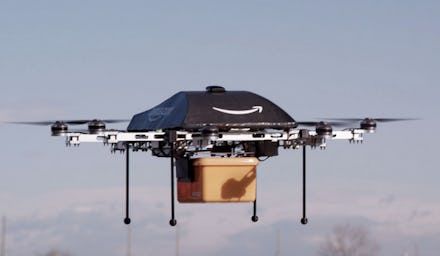Amazon Drones Are Years Away, But Air Regulations Could Still Lag

Amazon's surprise announcement on 60 Minutes that it is developing delivery drones was certainly a doozy. The idea that a remotely-piloted octocopter could deliver diapers to a stressed-out new dad seems like something out of science fiction — a wonderful, super-convenient type of science fiction. And it might stay that way, given the huge legal barriers preventing the idea's takeoff. At least for now, federal safety laws regarding both package delivery and the domestic use of drones seem to outweigh the novelty of drone-delivered packages.
Amazon's potential drone-delivery service, which is at least a few years away from becoming reality, would mean avoiding third-party delivery systems entirely. And beyond the obvious federal reluctance to bypass the U.S. Postal Service for business reasons (and an interesting sense of tradition), you might be surprised how much federal red tape surrounds sticking a stamp on a letter and sending it. As Forbes points out, the federal government has an interest in tracking all sorts of deliverables, including quite a few things that Amazon ships.
If you ship your packages at one of the fancy, automated postal centers at the post office, your picture is saved it for 30 days, just in case you are suspected of mailing drugs or something illicit. And if you ship something via any parcel-delivery service, your mail is logged and sent to the federal government for tracking. With a warrant, the federal government can open your mail because they know where it is and where you are sending it — something that's been pretty useful in the recent string of mailed ricin cases. These much-valued safety protocols could be completely sidestepped by Amazon's proposed system.
While Amazon is not proposing a person-to-person system, their drones would only be good for delivering items from Amazon to you. If Amazon successfully creates a delivery drone system, the federal government would have to consider more than just Amazon's use of these flying bringers of goods. If Amazon can deliver via drone, why shouldn't other companies be able to as well? New safety regulations surrounding the delivery of goods by drone would be necessary, and I don'thave a lot of faith in Congress to do that quickly.
Mail safety aside, the use of drones by private companies is currently illegal. This is a temporary hang-up, given that the government has cleared the way for the Federal Aviation Administration (FAA) to allow commercial use of drones by 2015. However, the bill does not stipulate the safety regulations for such an allowance.
It is difficult to imagine how a drone could land safely in front of a New York apartment without whacking someone on the way down. Would they put little cameras on the drones with motion detectors so they could time their landings without striking passersby? Perhaps, but then privacy concerns would come into play. I'm already feeling a little bugged walking around the streets of New York should I also be concerned about a flying Big Brother watching my every move? Or mistakenly dropping a box on my head?
Earlier this week, Sen. Edward Markey (D-Mass.), co-chair of the bipartisan Congressional Privacy Caucus, issued a statement in response to Amazon's announcement. He urged the FAA to create privacy regulations before these drones can take off.
"Before drones start delivering packages, we need the FAA to deliver privacy protections for the American public," he said in the statement. "Convenience should never trump constitutional protections."
In short, releasing these drones for any real use would require a complete overhaul of the federal laws surrounding parcel delivery. If any company is capable of making that happen, it's Amazon. After all, Jeff Bezos was operating an online bookselling business out of his garage in 1995, and he now operates the world's largest retail company.
The hard truth is that technology has always outpaced the law, and the lag time could be seriously problematic. At the very least, Bezos's science fiction-like idea could be shelved for years while the FAA decides how to make it as safe as possible.